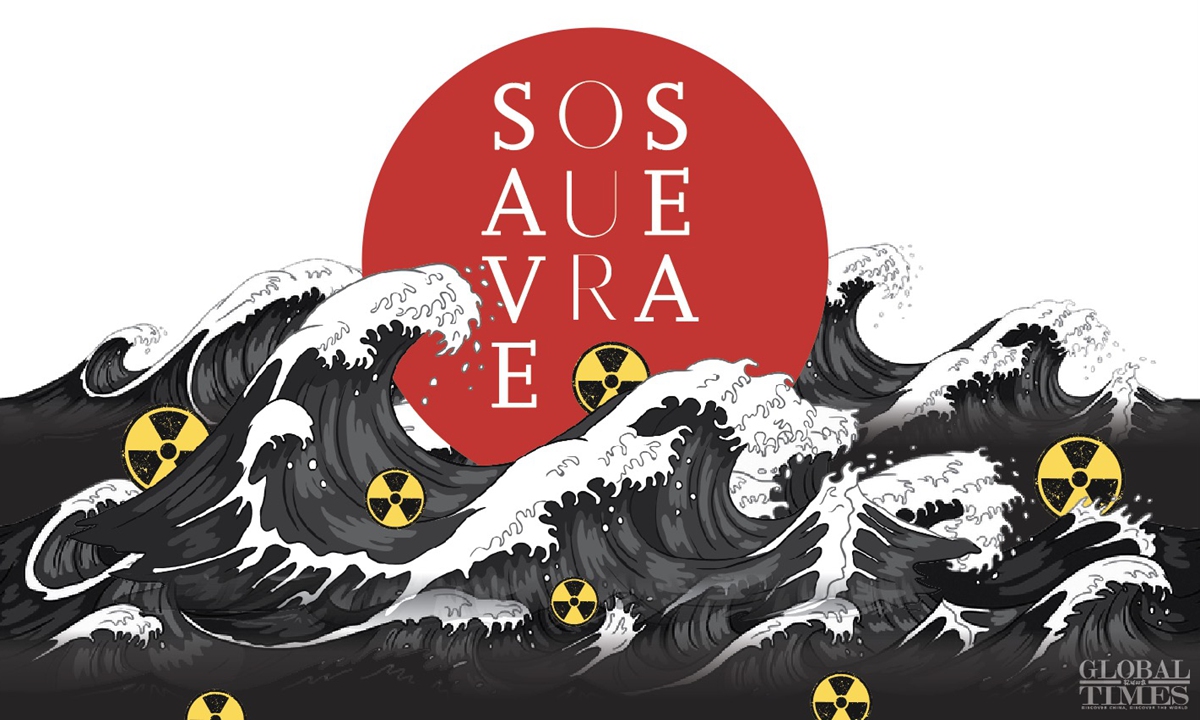ICJ advisory opinion key step in dealing with Japan's nuclear-contamination water dumping

SOS, Save Our Sea. Graphic: Xiong Xiaoying/GT
April 13 marks the one-year anniversary of Japan's decision to dump contaminated water from the Fukushima nuclear power plant into the sea. It is necessary for the international community to stop this, and one of the keys is to prove that Japan would be violating its international legal obligations. A better strategy would be to first request the International Court of Justice (ICJ) to issue an advisory opinion on the illegality of the planned dumping.First, such a request will be effective if successfully made to the ICJ, judging from their previous advisory opinions.
Second, a request for an advisory opinion could lower China's burden of proof and promote cooperation with stakeholders such as South Korea, North Korea, Russia, and the Pacific Island countries.
Third, an advisory opinion is morally binding and can effectively support subsequent accountability activities. Although not legally binding, an advisory opinion given by the authoritative ICJ against Japan's plan to dump nuclear-contaminated water will put the country under greater moral and public pressure if it does not give up the dumping plan. In addition, the ICJ's advisory opinion will effectively support international litigation and arbitration, and important points can be used as a critical basis for court arguments.
Fourth, such a request will reflect China's contribution to international legislation, and promote the improvement of the international law system.
Of course, there are limitations to such a request. First, it's difficult to predict how the ICJ will view Japan's dumping plan as there have been few precedents on nuclear-related issues since the establishment of the ICJ and the International Tribunal for the Law of the Sea (ITLOS). In the precedents available, international judicial bodies have been cautious in dealing with nuclear-related issues.
Second, China cannot directly request an advisory opinion from the ICJ, but needs to jointly submit a motion for an advisory opinion in the United Nations organs and specialized agencies together with the interested countries. From past experience, the UN General Assembly is the most common and effective organ. So China's primary choice is to submit a motion through the UN General Assembly and make a resolution requesting an advisory opinion. The process requires adequate preparation and the support of a sufficient number of member states.
Finally, China still needs to prepare for holding Japan accountable through international judicial institutions. It needs to make preparations for two potential outcomes: One is that the ICJ won't issue an advisory opinion; the other is that Japan will not stop the implementation of its plan to dump contaminated water into the sea.
In summary, we propose exchanging views with Japan over its plan to discharge treated water into the sea. It's necessary to exchange views as soon as possible before Japan will officially start the plan in 2023. On one hand, we should exert pressure on Japan through talks. On the other, we should make preparations for other moves to hold Japan accountable. We could also figure out Japan's specific plans and intentions for dumping contaminated water through talks and acquire more pieces of evidence.
It's suggested we conduct close communications with other countries concerned including South Korea, Russia, North Korea and Pacific island nations, preparing to initiate motions at the UN General Assembly and other UN specialized agencies.
We should step up the collection of scientific evidence and strive for an advisory opinion from the ICJ. It's necessary for us to quicken the collection of fishery materials and the monitoring of nuclear-related data in coastal areas, so as to make a before-and-after comparison and calculate compensation. We should also use South Korea as a reference to promptly introduce or revise unclear-related regulations, and expand the scope and frequency of monitoring domestic radioactive materials, in order to provide a domestic legal basis for responding to Japan's dumping of nuclear-contaminated water.
Yen-Chiang Chang is professor of Law School at Dalian Maritime University and Duan Xingyi is LLM graduate of Law School at Liaoning University. opinion@globaltimes.com.cn
